| PEOPLE |
YEAR: 2007
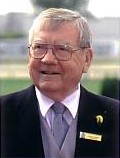 |
Harness racing, and in particular Addington Raceway, lost a friend with the recent passing of Mr Hugh Stevens.
A steward and committeeman for the NZ Metropolitan TC for over 20 years, Hugh had various roles within the Club but will be remembered as being the Club Surgeon for almost his entire tenure. Hugh shared in the ownership of a number of horses in both codes with his pride and joy being the first horse he raced, Margaret Dale.
Off the track Hugh was widely recognised as a skillful surgeon with special ability in the orthopaedic area. He travelled the world, visiting many countries as an examiner for the orthopaedic specialist qualifications.
Hugh was a strong supporter of Canterbury and All Black rugby, attending almost every match at Jade Stadium.
Hugh is survived by his wife Narie, his children and grandchildren.
Credit: Met Newsletter Feb07
YEAR: 2006
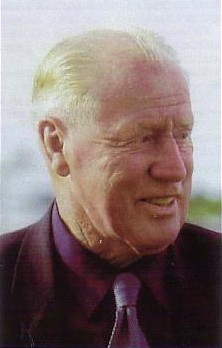 |
| Derek Jones MMNZ |
He was a superior horseman who trained more than 1000 winners, an entertaining raconteur and speaker, eulogist, part-time barber, and one who never lacked stamina when social activities demanded it. He was a spark at any gathering: no-one left his company without a smile. In short, he had qualities that cut a man above the rest. His death, last Friday at the age of 79, after complications following heart surgery three days earlier, was unexpected.
In the dust cover of his biography 'Win Without Boasting', author Don Wright introduced it by saying: "A master horseman, devoted industry servant, family patriarch, humorist, and a friend to all, especially those in less fortunate circumstances. Those qualities and characteristics sum up the life of Derek Jones MMNZ. A respected citizen, his consideration for others and ability to make friends is legendary. His mirth, humour and generosity towards all, including his staff, young horsemen and rivals have endeared him to many from all walks of life and stamped as a pillar of the industry. The famous Templeton trainer/driver is patriarch of a harness racing family that continues to exert a profound influence."
As an administrator, he was President of the New Zealand Trotting Trainers' and Driver' Association, and served in the same capacity for the Banks Peninsula Trotting Club. He was a trustee of the Addington Harness Racing Hall of Fame, honoured with a special award from the NZ Trotting Hall of Fame, and he gained recognition outside harness racing for the work he did inside with his NZ Order of Merit award six years ago.
He was also a tireless campaigner for achieving a fee for drivers. "When I started, a trainer didn't get paid if he drove a horse he trained. But you got paid if you drove a horse for someone else. It was ludicrous."
Derek's remarkable record as a trainer and a driver have been overshadowed in recent years by talented family members profiting from his actions in standing aside. Son Peter said winning the New Zealand Cup for his father with Hands Down was a bigger thrill than when he trained Borana to win it. "I wanted the win with Hands Down to be a bigger thrill for my parents than me. It was a way of paying them back for all they had done for me."
Derek's grandson Anthony Butt was given favourable opportunities to establish himself, and in his first season of driving won the national junior drivers, title. Butt recalled a remark that was so typical of his grandfather..."I remember being in the drivers' room after Blossom Lady ran fifth in her first NZ Cup, and feeling so disappointed about it, but Derek came into the room and said 'at least it saves us from having a party'. I felt a bit better after that." His brother Roddy was also a former national junior driving champion, and Tim, another grandson, trained recent champions Take A Moment and Lyell Creek, plus top liners Sonofthedon, Happy Asset, Mister D G and Foreal. Other trainers who 'did their time' with Derek and became successful were Nigel McGrath, Erin Crawford, Stephen Doody, Kelvin Harrison, Ray Sharpe and Andrew Stuart.
Training in partnership with Jack Grant, Derek headed the Training Premiership twice, in 1965 and 1969. Grant, who was with Derek for 24 years and stable foreman before becoming a training partner, said: "They were the best years of my life. If anyone should have driven 1000 winners" - he drove 814 - "it should have been Derek, but he stood down for Peter and then for Anthony."
Top trainers Max Miller and Tommy Behrns can vouch for his generosity and kindness. Miller said: "He was a special sort of fellow. I had Jacquinot Bay who was a good horse, and I wanted to race him in sprints and take him to Hutt Park. It didn't suit the owner who wanted to race him in the Cup, so he got Derek to train him. He ran third in the Hannon but didn't do much else. When he was sold, soon after, Derek sent the commission to me. I wouldn't expect many others to do that."
Behrns said he was the most caring guy in the game, "and we are not talking about racing here. I'm referring to the times he spent seeing the elderly and infirmed. Time after time you would see him leaving the trials and take off to visit someone in a home or the hospital. There wouldn't be a month that went by without him coming to see dad (Jack), and for the last five years he was housebound and didn't get many visitors. He meant the world to dad. He'd done it all his life."
Derek was born in Christchurch in 1926 and became a hardresser "long enough for me to get sick of it". He started his driving career at Methven in 1946, aged 19, and drove his first winner - Quite Clever - in a division race at Riccarton two months later. Soon after, he moved north, winning races with Silent Knight and Culture, two smart horses trained by Dan Fraser.
His first horse of great class was Soangetaha, who arrived while he was still a young man. A son of Light Brigade, Soangetaha was one of three horses brought south by Derek in 1949 following an air crash that claimed the life of Andy Ryland. Culture and Barrier Reef were the others. Soangetaha won 15 races including two Auckland Cups, two heats of the Inter-Dominion and was runner-up in the Grand Final. "He was a superb horse. They talk about Harold Logan, but I never had a horse that could begin as quick." The year after Soangetaha was beaten in the Grand Final, he won the Dominion Handicap with Barrier Reef, always regarded by Derek as the fastest trotter he has driven. Many good horses followed, including Trueco, Dismiss, Somerset Lad, Slick Chick, Cheta, Lochgair, Dispense, Snowline, Dupreez, Our Own, Diarac, Doctor Dan, Ardleigh, Smokeaway and Disband.
Derek had great affection for Disband, a U Scott mare renowned for her notoriously bad manners at the start. "She would never begin," he said. "The first time she got a mobile she had too much class for them."
At the end of the 60s and start of the 70s, Leading Light, Light View and Topeka were stable stars, followed by Premiership, Hands Down and Blossom Lady. Hands Down won a NZ Cup, three Easter Cups, four Louisson Handicaps and a NZ Free-For-All. Derek drove him in most of his trackwork, but Peter handled him on raceday.
As great as the good ones were, Derek thought Blossom Lady was the best of them. "Ability-wise, she had to be the best I had." He said when she was at her peak that he had to "murder her in training. The harder you were on her, the better she would race. It was simply a matter of facing up to that reality. Her recovery powers after strenuous races and work were amazing. That was what stood to her and made her such a great stayer." Besides the NZ Cup, she won 43 other races including two Standardbred Breeders Stakes, a NZ Free-For-All, two Hunter Cups and five Inter-Dominion Heats.
During that time, principal owner Ralph Kermode wrote a letter to Derek that said in part: "Thank you for all the time and effort you have put into 'Bloss' and the expert way you have managed her and kept her going so long. Thank you for your frequent hospitality and your friendship."
Outside of harness racing, visiting the sick and delivering eulogies at funerals, Derek enjoyed the opera and musicals, rugby, travelling, meeting friends and making new ones, and supporting his wider family. Just days before he died, he was making plans for his next overseas trip. Nothing, however, gave him as much pleasure as helping someone else less fortunate than himself.
In that respect, he truly was a man without peer.
He is survived by his son Peter, daughters Glenys, Jennifer and Leigh, 10 grandchildren and 10 great grandchildren.
-o0o-
The funeral was held at Addington Raceway on Monday 3 July, 2006 attended by about 1500. The white hearse was led down the straight by the pacer Bowencourt because she has such a close resemblance to Blossom Lady. He left the track to the commentaries of Blossom Lady and Hands Down winning their Cups echoing around the course.
-o0o-
On a board in the stable is a sign on diplomacy, which reads "The ability to tell a person to go to hell in such a way that he looks forward to the trip."
Credit: Mike Grainger writing in HRWeekly 5Jul06
YEAR: 2006
Dudley Moore, who died recently in a Blenheim rest home at the age of 88, had a long and notable association with harness racing. Along with his brother Dennis, he bred and raced the wonderful pacer Caduceus, and stood at stud the successful sire, Tuft.
Caduceus, by U Scott from Little Ada, won 28 races in NZ, 18 in Australia, and took a record of 1:57.8 in the US when he was 12. He was trained by Jack Litten to win the 1960 Inter-Dominion Grand Final at Harold Park at his sixth attempt, when he was nine.
Moore was a former steward of the NZ Metropolitan Trotting Club and was a regular vendor at the national yearling sales.
He is survived by five children, including Dennis, who bred the 2005 NZ Cup winner, Mainland Banner.
Credit: HR Weekly 29Oct06
YEAR: 2006
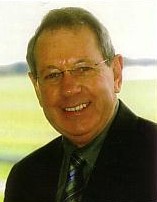 |
His retirement has prompted a trans-Tasman search, but as Canterbury Jockey Club Chief Executive Tim Mills says, "they're pretty big boots to fill." However, Murtha's experience and depth of knowledge about racing won't be lost. NZRB Head of Broadcasting, Glen Broomhall, says Murtha will continue to work with the New Zealand Racing Board and use his lifetime of experience to contribute to the future of race broadcasting. "Reon's vast experience will be used to mentor a new generation of race callers, with a view to maintaining the high standards to which he has always been committed," Broomhall said.
Murtha's first introduction to racing was on the West Coast where his father was on the committee of the Reefton Jockey and Trotting Clubs and his grandfather was a Clerk of the Course. "It was a boyhood ambition of mine to become a race caller," he remembers. It all started in the late 1950s. A young man's dream of calling the best of them past the winning post was nurtured and practised by calling ice-cream stick races for his mates on the many small creeks and water races that surround the small, sleepy West Coast coal-mining township of Reefton. Reon Murtha, once NZ's only full time professional racecaller, describes those early races as "a feat of imagination. You had to use a lot of imagination to keep the flow going as the gaily painted ice-cream sticks, often named after popular racing stars of the day, floated down the mine water races," he recalls "They would get caught up in the brambles or eddies, and I would have to keep the commentary going, sometimes for ages."
"I was probably the youngest person to frequent the pubs in Reefton," Reon confesses, "but all with good cause." His father took over the agency for the 'Turf Digest' and 'Friday Flash', and Reon earned pocket-money operating the sale of these as a paper round. "I had a regular clientele of 109 customers, and what they didn't buy I would sell in the pubs around town."
In 1959, at the tender age of 17, Reon packed his bags and headed off to an interview at the Greymouth offices of the NZ Broadcasting Corporation. His dream - to be a race caller... But not yet, for it seemed his voice had not matured enough, and there were no vacancies at the time. However, he still joined the corporation as a technician. Little did he realise then that over the next years thousands would hear him call the winners of Inter-Doms, NZ Cups and strangely enough, royal weddings and papal visits.
In 1960, Reon's dreams finally began coming true. The Reefton Jockey Club, looking for a racecaller, asked him to try out for the position, sight unseen. They were not dissappointed. Reon used this opportunity to make a demonstration tape, and on the strength of this tape and several departures from the staff of the Greymouth broadcasting offices, he was appointed race caller to the Greymouth Trotting Club.
In the years that followed until his appointment as race caller with the Canterbury Jockey Club in 1969, Reon used the time to refine and hone to perfection his skills of race calling. He describes it as the skill of being able to put into words what your eyes can see, recognising colours and names, without interrupting the flow of the commentary.
While there was no official training for such a calling, he says training as a radio announcer on Greymouth radio stations helped him to use his voice and language in the right way and achieve his aspiration. But it isn't the easiest of professions to master. Many people can call famous past races as they happened, but few possess that extra ingredient of being able to talk about something the instant it happens, without interrupting the flow, when there are thousands of people hanging on to your every word. Each horse's name and colours have to be learned before the race starts; then when it is all over you instantly discard them and start afresh on a new set of horses for the next race.
Travelling back and forth across the Southern Alps to cover meetings on both sides of the island was hard work; so, in 1971, following the Inter-Doms, Reon packed his bags and transferred to the Christchurch offices of Radio NZ. From there, Reon's career has taken him all over the world. He has called Inter-Doms from Australia; attended the Red Mile in Lexington, Kentucky, in 1983; travelled to Europe in 1984 to attend the English Derby.
Invited as a guest commentator for the Royal wedding of Prince Andrew and Sarah Ferguson in 1986, Reon ranks that as his most memorable occasion. As part of the Radio NZ team covering the Commonwealth Games at Edinburgh, Reon was invited to join a team of eight commentators covering the wedding for the ABC, and his particular section was the royal procession to and from Westminster Abbey. "We had to translate the colour and spectacle of the occasion for the thousands of listeners world-wide. My most nervous moment ever."
His career since then has been studded with both thoroughbred and harness racing industry awards reflecting his outstanding contribution, as well as mainstream awards like the MNZM he received in 2005 for services to broadcasting.
Calling such historic races as the 1980 NZ Cup duel between Delightful Lady and Hands Down at Addington has contributed to scores of great memories, but Murtha is well known as an objective caller who doesn't allow his opinions and emotions to influence his commentating. It hasn't always been easy to subdue the excitement; for example, the South Island Thoroughbred Breeders Stakes in April this year, which was won by Ombre Rose, a filly he part-owns, was just one of seven wins in which he was able to call her home first. The professionalism he maintained on that occasion and at all times has earned him respect industry wide.
"Reon has been the voice of Addington since 1971," said Addington Raceway CEO Mike Godber. "His calls of the great NZ Cups and Inter-Dominion Finals have been heard and seen throughout Australasia and made him a legend in his own right. He is the last of a great era of radio commentators who called through the 1970s and 80s. Reon has been a true professional through his background training in radio, and he was just as effective on Trackside TV and ranks right up there with the legendary commentators Dave Clarkson and Peter Kelly," Godber said.
Mills says Murtha's retirement marks the end of an era. "Racing is an industry that revolves around horses, jockeys and trainers, but there are others who put an important mark on the game," Mills said. "Reon has been an outstanding personality on the turf. Generations of race followers gew up with his voice. His name was synonymous with racing in the south. He is a true grentleman of the game - you never hear a bad word about him. He will be very difficult to replace.
Credit: HRWeekly 4Oct06
YEAR: 2006
Bill McDonald, the breeder and early trainer of the outstanding juvenile Starship, died recently. He was 81 and suffered from the degenerative eye disease glaucoma before cancer took its toll this year.
He was born in Christchurch. He started in the printing business, sold pet food and ran a dairy before starting work for Noel Berkett. In the mid 1960s he was breeding and training himself, with Red King, Whippet, Loyal Friend, Lord Flicka and First Girl being some of his early winners. He had a great deal of success with horses other people had given up on, including Full of Promise, the last horse he trained, who won four in succession on the West Coast circuit in 1996.
His major success came from breeding Starship, Star Heritage (dam of Star Loner, 1:54.2, Atom Star, 1:52, Star of Mine, 1:52.4) and Venetian Star (dam of Anvil's Star, 1:59.3, Soky's Special, 1:57.8 and Star Rhapsody, 1:58.1) from Star Nurse. By Good Chase, Star Nurse left 12 foals, but Starship was by far the best. He won 16 races from 81 starts, for $341,975. McDonald trained him for 12 wins before selling him for what then he called "a fortune".
For most of his career he trained at Woodend and then moved to Rangiora about 12 years ago. He was loyal to his drivers, particularly to Ian Cameron, and they would often travel to meetings together with their horses. He was a regular seller at the National Yearling Sales.
One of 15 children, McDonald grew up in the Depression and was taught to live frugally.
Credit: HRWeekly 16Nov06
YEAR: 2006
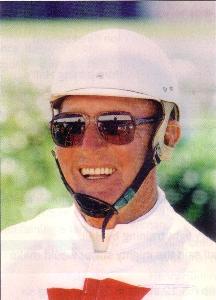 |
In his era, he was a champion professional track sprinter, and twice, in 1941 and 1946, won the prestigious Tuatapere New Year's Day Sheffield (over 135 yards). Between times, he was an air gunner with the RNZAF based in England and Ireland.
His flagship horse was Maida Million, a mare by Brahman he raced in partnership with Les Dyet. She won nine races before being sold and joining Eddie Cobb's stable, where she raced with great success and was four times leading aged mare in the U.S.
He trained Rustic Lad to win 14 races for Southland owner Bill Faulkner. Most notable was the one in May, 1958, giving Maurice Holmes his 1000th winning drive. As a driver, one of his most memorable occasions was one with Fiery Cross at Forbury Park, where a rein broke and he had to climb on the back of the horse to bring it under control. For that, the club made a presentation to him.
His best trotter was Bachelor Tom, a speedy and stylish trotter by Bachelor Hanover who won 14 races, and others of note included Hobart Lord, Fantastic and Noodlum's Fella. His last winning drive was Five Star at the Hororata meeting in 1996, his last training win came with Toffee Nose at Ashburton a year ago, and three years ago he was still driving at the workouts.
He was ably supported by his wife and companion Noline, who shared the same love of horses and racing. He is also survived by a daughter Robyn Robb, three grandchildren and four great-grandchildren.
Credit: HRWeekly 6Dec06
YEAR: 2006
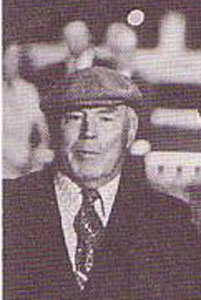 |
He was based at Pleasant Point when he bred No Response. He prepared the Hodgen's Surprise - Cordsworth gelding for his first two wins at Orari and Washdyke after the gelding began his racing career as a 6-year-old. No Response was transferred to Richard Brosnan at Kerrytown after Black had a stroke.
No Response won 12 races, including the Inter-Dominion Final, from 16 starts in the 1978/79 season. He also won three heats of the Inter-Dominion and the NZ Trotting Championship on the final day of the carnival. He was voted Harness Horse of the Year in 1979, the first trotter to win the title. No Response won the 1981 Rowe Cup in Auckland. He retired the winner of 24 races from 60 starts.
Credit: HR Weekly 26Oct06
YEAR: 2006
 |
His best winner was the Keep Away mare, Peterson's Pride, who won four races - two at Addington and a double at Blenheim. In three of them she was driven by Russell Carter, who achieved greater awards later with Miss Pert, and in the other by Peter Mounce, Trevor's son. She paid $40.65 beating Scottish Chat and Armbro Pine, and gave Peter his first winning drive.
But his major triumph was preparing Mighty Chief to win two races when he was an old horse, unsound, and more or less retired from racing by his owner, Lester Clark. By My Chief, Mighty Chief had been a top trotter for Clark, winning the Dominion Handicap fron Acquit and Flying Maiden when he was just five. He won a further three as a 6-year-old, but had fewer than a dozen starts over the next three seasons.
After Clark had gone to Forbury to handle Flying Nominee for Mounce, he told him he would be better off trying one he had in the paddock at home - Mighty Chief. Mounce picked him up the next day, and with months of slow work round the country roads, a diet of swans eggs and the use of methylated spirits to harden his legs, brought him up to race fitness again.
As a 10-year-old, he resumed in grand style at Addington, winning for Bob Nyhan, beating Tony Bear and Merrin, and paying $84.75. He held his form, winning again two starts later at Greymouth with Clark driving, and was placed six times after that. He was raced lightly over the next two seasons, and gained a placing, which ended a remarkable comeback. "It was a labour of love, and they played the Addington race at his funeral," said his son John.
Mounce, who died last week a month short of his 88th birthday, has most of his family associated with harness racing to some extent.
Credit: Mike Grainger writing in HRWeekly 20Sep06
YEAR: 2005
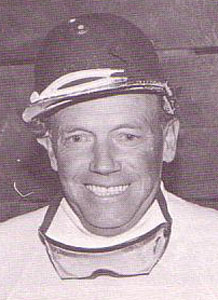 |
George Shand had his last drive on the unplaced Eastwood Jaunty in the Green Mile at Methven on Sunday. "I just haven't been too good health-wise and decided to stand down," Shand said.
He trained and drove Eastwood Jaunty to win the inaugural Green Mile in 2000. The gelding has contested the six Green Miles. He finished second to Bruzem in 2001 and third to Oaxaca Lass and Niobium in 2002. Eastwood Jaunty has won 13 races including the 2003 Methven Cup.
Shand, who turns 76 on Friday, drove 373 winners including Satyr who won the main race, the McCloy Memorial Handicap, at Methven in 1960. He drove his first winner, Lochella, at Wanganui in October, 1951. Lochella was trained by his father-in-law, Peter Gallagher.
"One of the highlights was winning the Ashburton Flying Stakes with Mighty Gay. I always had a soft spot for the horse," Shand said. "Another was winning a race in Australia (at Mildura) with Eastwood Jaunty."
Mighty Gay won the Flying Stakes in 1976. Shand trained and drove Borana to win the Forbury and Oamaru Juvenile Stakes in the early 1980s.
Credit: Tayler Strong writing in HRWeekly 14Dec05
YEAR: 2005
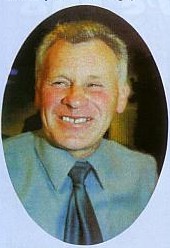 |
Canterbury's close-knit harness racing industry farewelled one of its favourite sons on Saturday. Murray Butt's public funeral was held at the Templeton Community Centre, near Christchurch, at 12noon. Butt, aged 59, died suddenly and unexpectedly at his Templeton property, Oriole Lodge, on Tuesday 6 December.
The Canterbury harness racing community was rocked by the sad and unscheduled circumstances of his passing. Many are struggling to come to grips with his untimely death. Acclaimed as a modest and unassuming personality, he invariably created the impression he wanted to get along well with as many people as possible. He was very good at it.
A warm humoured and agreeable individual, he shunned conflict and criticism and invariably demonstrated acceptable gentlemanly ways that endeared him to all he knew. He was once described by a respected contemporary as "unflappable and always the same.''
His marriage to Jennifer Jones, a daughter of industry legend Derek Jones MNZM, in April 1965 was to forge an alliance of two of Canterbury's famous sporting and harness racing families that has exerted profound influences on the growth and recognition of the industry in New Zealand.
All three of their sons, Tim, Anthony and Roddy have enjoyed huge success and their only daughter Chrissie is married to prominent trainer Cran Dalgety. It would be superfluous to list the prolific feats with horses of their three sons who are industry household names.
But a special spot, of course, will always be reserved for the likes of champion trotters Lyell Creek and Take A Moment and pacers Mister D G, Happy Asset and Blossom Lady (trained by Derek Jones) and Justaboyden and Judicial who were major Perth winners for Roddy. Anthony was regular driver of Blossom Lady (two A G Hunter Cups and a NZ Cup).Anthony and Roddy were the first drivers to win dual Australasian Junior Driving Championships.
Murray Butt was a son of the late Wes Butt, New Zealand's leading trainer on seven occasions between 1945 and 1962. Wes also topped the national drivers' premiership in 1945-46 and 1952-53. Murray's father-in-law Derek Jones twice won the trainers' premiership in 1965 and 1969 in partnership with Jack Grant (late) and is one of only three New Zealand trainers to top 1000 wins (1011), the others being Cecil Donald (late) and Roy Purdon. Murray's brother Robin of Preston Farm, West Melton, was also a household name in harness racing as the trainer and/or driver of Locarno (Miracle Mile), Camelot (NZ Cup) and classic winner City Rogue. Murray's nephew David Butt (son of Robin) topped the 2003-2004 trainers' premiership in partnership with his wife Catherine.
Murray first met his wife Jennifer at Templeton Primary School before Murray spent the 1960-62 period as a boarder at St Andrews College in Christchurch. "And, when I came out of St Andrews, there was Jenny waiting for me," Murray recently quipped to the writer. The young couple got away to a flying start in life with the winnings of champion filly Golden Oriole who was raced by Murray and trained by his father. After she won her first race, Murray exercised a right of purchase (450 pounds) on the filly he leased from Jim Dalgety. Golden Oriole won about £9000 at a time when a pound was a pound and was later sold to clients of USA horseman Eddie Cobb for the equivalent of about $40,000 as a 5-Year-Old. Golden Oriole won 10 races in New Zealand and was champion 2-Year-Old of her year when she won the NZ Sapling Stakes, one of four straight wins in that campaign.The daughter of Local Light won the Great Northern Derby at three. Murray's father Wes was not only the trainer but also the "Responsible Person'' in terms of ownership legalities as Murray was technically too young to assume any ownership role. Golden Oriole was no slug in open ranks before her sale overseas. She beat the mighty Lordship in a feature Addington sprint.
Funds from Golden Oriole's sale to USA assisted Murray and his wife to set up the Oriole Stud that they operated during the years 1968-1983. Sires they stood at the property included Good Time Eden, Tartan Hanover, Gentry, Scrappy Wave, Crockett, Pacific Hanover, Leading Light and Valerian. Dual gaited Crockett, sire of standouts Bronze Trail and Sprockett, was probably the pick of the sires they stood.
Murray gained his first success as a trainer with Countaway on January 10, 1973. He actually prepared a small team of six horses while mixing stud duties with that pursuit. Game Nian (eight wins) was a capable trotter for him. As a driver, he posted two notable wins with talented pacer Golden Moose in the Kaikoura Cup and the 1985 NZ Firestone FFA, the second leg of the TAB double on Cup Day. His brother in law Peter Jones won the first leg, the NZ Cup, with outsider Borana.
Murray was a former president of the NZ Harness Racing Trainers and Drivers' Association that he represented for three years at HRNZ Executive level before standing down three years ago. He was also the president of the Canterbury branch for five years (1990-1995). Murray Butt enjoyed helping his son Tim at his showplace training establishment where he also took a close interest in horses part owned by his wife Jennifer in trotters Genius and Lotsa Speed this season and another grand trotter in Noam in 2001 and 2002. Noam later raced with distinction when sold overseas. Viewfinder, Keep Up, Night Hawk, Peeping Tom, Success, Marmoose and Roimata Lad were only some winners Murray trained earlier in his career. The Sniper, Red Tip Governor, Cracker Nova, All Talk, Bizness, Bolaz and Bestoranum were a handful of useful outside drives he was associated with. Murray Butt and his wife enjoyed several overseas trips to follow the success of their sons.
The couple eventually subdivided half of their original 100 acre block of land and they bought the late Wes Butt's 16-acre Mankind Lodge complex at Templeton where the couple built a 20-bay all weather golf driving range in 1995. They operated the venture themselves for a year before leasing it out.
Murray and Jenny Butt were seemingly inseparable companions at Canterbury harness racing fixtures and also at Auckland and overseas raceways. They derived much genuine pride in the success of their children in harness racing and invariably accepted it modestly and graciously. The couple's numerous grandchildren were also a source of much warmth and enjoyment. Murray and Jenny Butt's combined act will be difficult to follow.
Credit: Don Wright
| << PREVIOUS | 1 2 3 4 5 6 7 8 9 10 11 12 13 14 15 16 17 18 19 20 | NEXT >> |